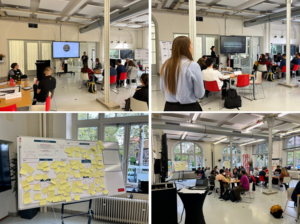On October 4th, the Robotics4EU project hosted its final workshop from the series of co-creation workshops focusing on bringing together robot developers with end-users and stakeholders to discuss the societal aspects of robot development. This time the focus was on robotics within Inspection and Maintenance. In total, four topical workshops have now been held, each with specific focus on one of the projects main areas: Agri-Food, Healthcare, Agile Production and Inspection and Maintenance.
Following up from the agile production workshop
The workshop took place at RoboHouse in Delft, Netherlands and engaged 18 participants. The workshop followed the same structure of the workshop held the previous day and gave the participants an opportunity to explore new perspectives relevant to the field of robotics in I&M and to dive deeper into the discussions from the first day.
At the heart of the workshop was a custom discussion game developed by The Danish Board of Technology. This tool aimed to guide group discussions, enabling participants to evaluate societal acceptance aspects of the presented robotic solutions. It facilitated conversations on important societal topics, including Data, Environment, Human-experience, Legal, and Socio-economic and Engagement.
Throughout the workshop, participants were organised into four groups, each assigned to focus their discussions on a specific robot. To facilitate their discussions the participants used a discussion game designed by the Robotics4EU project.
The different robots participating were:
- SINTEF: A Snake-like robots that can contribute to efficient inspection and maintenance of critical services to citizens and the society, e.g.: keep road tunnels open, ensure that wind turbines can produce energy, etc.
- Panza Robotics: Quadruped robot that can carry out routine tasks, such as area surveillance, condition monitoring of heat, toxicity, chemicals, or predictive maintenance
- Orbiba Robotics: Working on technology for robots that can enhance precision agriculture

Key Outcomes and Themes:
The workshop discussions brought forth key themes regarding non-technological aspects of robotics in I&M:
- Involvement in the green transition and change in work: Discussions focused on the ways to design and construct solutions for instance, by designing and incorporating electric-driven solutions that help contribute towards a greener future. Reduce travel as a result of increased automation, minimising the physical need for workers to be at job sites.
- Commitment to sustainable practices and partners: Related to component use (such as batteries that have a considerable environmental impact and the need for using more eco-friendly components). Further, the need for partnerships that have environmental commitments.
- Need for standardisation and clear guidelines: Addressing liability issues, particularly given the strength and torque capabilities of many robots in the inspection and maintenance field. The need for clear guidelines concerning liability issues and explicit legal agreements between developers and customers are needed.
- Regulatory differences between countries: Related to challenges of varying legal guidelines in different countries, potentially leading to differentiated liability and a need for addressing these challenges through proactive measures.
- Positive changes in the job market: Discussions were on how solutions might alleviate people from doing dangerous and difficult jobs. The need for trust in these situations is paramount, for instance via improved communication or user interfaces and proper training and guidance of operators.
- Need for technical knowledge in certain areas: Highlighted as a significant barrier to adoption, because some solutions necessitate a certain level of technical knowledge for effective operation. Relevant to the importance of making the robotic solution more accessible to a broader user base, particularly those with limited technical expertise.
- Fear of job loss and upskilling/education: Specifically with regard to the importance of addressing challenges, such as upskilling, to ensure a smooth transition in the evolving job market influenced by robotic development. The need for educational initiatives that can give workers the necessary robotics skills required due to changes in their work environment and advocate for a broader strategy involving the integration of robotics into educational systems.
- Data collection and privacy: Focus was on how to ensure well-defined methods to secure locally stored data, including precautions against theft as well as promoting transparency, accountability, and safeguarding privacy. The need to seriously consider the challenges related to human-robot collaboration, particularly focusing on how humans might feel in the vicinity of a camera-equipped robot.
- Financial structures as barriers for implementation and testing of the solution: For instance, in regard to the difficulty in finding funding to scale the solutions and test them with relevant stakeholders. Overcoming financial barriers and exploring innovative testing approaches are crucial for the successful implementation of robotic solutions.
Our series of co-creation workshops has come to an end – What now?
Our series of co-creation workshops have now come to an end. And what a journey it has been. We have been met with eagerness to participate, debate, and discuss and open-mindedness to agree and disagree. And we owe a huge thank you to all participants, who travelled to Vilnius, Oslo and Delft to share their insights, knowledge and to engage in fruitful discussions on the future of robotics within: Agri-Food, Healthcare, Agile production and Inspection and Maintenance. We could not have done it without the willingness by companies and companies who have put their solutions on the line and up for discussion.
What now? Now, we have been working hard on summarising all the results from the workshops in a large workshop report and sharing our learnings with the community! Stay tuned as it will soon be published on the Robotics4EU website.
We also have other great news. After receiving a lot of great feedback and interest from the participants on the discussion tool, we have decided to update it and compile it as an open-source free toolkit that can be downloaded from our website. So, make sure to check back once it is available.









